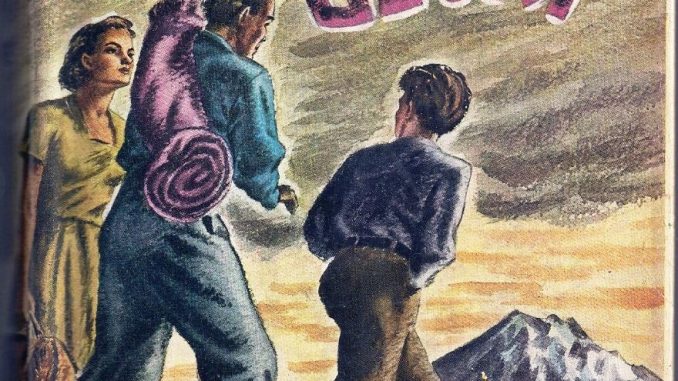
An engrossing self-penned account by one of Americana’s key figures.
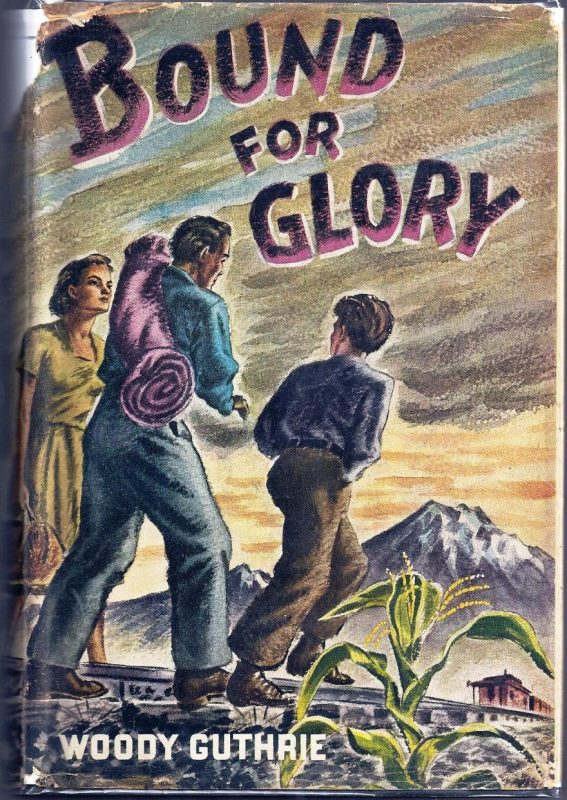 When starting this series I said something about not wanting to review biographies of any sort – and here I am about to renege on that proviso. Rather than make all sorts of excuses I would have to say that there are some books that you just can’t leave out. Further to that I had never read, ‘Bound for Glory’, so here was my chance. My presupposition was that the extended form might expose some weaknesses in Guthrie’s talent. As good as they are, his songs are simple (in the best possible way), brief, and often rely on considerable repetition. Nonetheless, his ability with a telling image and description is hard to beat, and somewhat to my surprise, his book has definite literary quality. This rests in the vividness of his descriptive ability and the understatement which leaves the reader with work to do (but not so much that you become disengaged). These qualities are documented by other critics as in this Guardian article,
When starting this series I said something about not wanting to review biographies of any sort – and here I am about to renege on that proviso. Rather than make all sorts of excuses I would have to say that there are some books that you just can’t leave out. Further to that I had never read, ‘Bound for Glory’, so here was my chance. My presupposition was that the extended form might expose some weaknesses in Guthrie’s talent. As good as they are, his songs are simple (in the best possible way), brief, and often rely on considerable repetition. Nonetheless, his ability with a telling image and description is hard to beat, and somewhat to my surprise, his book has definite literary quality. This rests in the vividness of his descriptive ability and the understatement which leaves the reader with work to do (but not so much that you become disengaged). These qualities are documented by other critics as in this Guardian article,
‘His ‘oral’ style is powerfully moving, its emotions subtly implied rather than spoken’
Something to consider is the contribution of editor Joy Doerflinger, (there may also have been others involved such as second wife Marjorie) who some feel over-corrected Woody’s text. It may be that as with several aspects of Guthrie’s life and art, things are not always what they seem. The tradition of the American ‘tall tale’ is well established and the natural subjectivity of any author can make it difficult to sort wheat from chaff, fact from embellishment, or indeed outright fabrication.
On that basis, I thought it a wise idea to read a biography. Though it is now 40 years old one of the most recommended is that by Joe Klein – and a good read it is too. I came away from that book thinking that if anything there were many things that Guthrie underplayed – usually in relation to family tragedy. There were also things that to his discredit (and as others have pointed out) he omitted. There is little or no mention in, ‘Bound for Glory’, of his first wife Mary and her three children (all three died young, including 2 daughters of Huntington’s Disease). For all of his charm and artistry, Guthrie seems to have been quite a selfish man and the type of father who was often not there, and when he did show it was in a great show of affection and largesse. Guthrie seems to have idolised his own father who was a businessman, initially very successful, eventually quite the opposite, who relied greatly on his fists. Everything about Guthrie senior’s business life seemed to trouble his wife. The gradual onset of Huntington’s is well documented in Klein’s book and for both Guthrie and his mother the interface between personality and illness is hard to gauge – and I am not aware that anyone has been able to puzzle that one out.

Klein’s book recounts the story of a bright diminutive child born to a relatively prosperous family in Okemah Oklahoma in 1912. He became something of the class clown and a lonely soul – ‘abandoned’ is the word used – described as childlike rather than childish. Guthrie was left/chose to fend for himself at the age of 14 / 15 as his father’s business affairs declined and his mother succumbed to her illness. Guthrie married young and as mentioned was a poor husband to his first wife Mary and a poor father to their three children. He prospered by way of his magnetic stage presence, his cartooning abilities (his book is filled with them though not everyone seems to like them), and his ability to write a telling song at the drop of a hat. He traveled the country spending time in California (where he made his first breakthrough into radio) and New York with several stops in-between. He self-defined as a socialist and a supporter of Stalin and may well have been a member of the communist party. He was certainly a declared anti-fascist. He spent time in the Merchant Navy and the army during WW2. After the war, he fell in with Pete Seeger and the Almanac Singers and his second wife Marjorie came on the scene. There is an amusing incident in Klein’s book when Guthrie is called out as being a bogus ‘Okie’ – the observation being made that he was never a true working man and never got his hands dirty. I’m not sure that detracts from his status that much although it seems a point well made. It is apparent that he played up to the image of the simple ‘Okie’. He generally scuffled enough money with his music to keep body and soul together without too much physical toil.
Guthrie married his third wife Anneke in 1953 by which time it seems clear, despite many a misdiagnosis, that he was suffering from Huntington’s Disease, although he was also treated for alcoholism. From that time on he declined steadily, in and out of hospital and permanently in medical care for the last years of his life, until his death in 1967. He fathered 8 children in total.
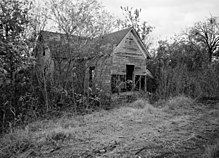 ‘Bound for Glory’, was completed in 1942 and first published in 1943. It could be described as a Picaresque novel and opens with a chapter describing a train journey, wherein all hell breaks loose inside the boxcar on which Guthrie and his friends are traveling. The book concludes with the outcome of the same journey.
‘Bound for Glory’, was completed in 1942 and first published in 1943. It could be described as a Picaresque novel and opens with a chapter describing a train journey, wherein all hell breaks loose inside the boxcar on which Guthrie and his friends are traveling. The book concludes with the outcome of the same journey.
Guthrie describes his early years as the middle of 5 children by Charley and Nora. It seems a happy early childhood and he describes at length climbing too high in a tree and his mother persuading some local youths to rescue him. He can’t have been too fearful given that he seems to recount events word for word. Throughout the book, the lives of children are described as violent, particularly when the oil boom hits town. Yet at the same time, there is a lengthy account of making, riding and taming stick horses – utterly childlike. Guthrie describes a gang fight in chapter 7 that is particularly vicious and it’s something of a miracle that no one is killed. His own illustrations introduce us to the wooden barrel used as a tank whilst the chief weapons seem to have been heated rocks and slingshots. Eventually, Guthrie and a defector invent the ‘cannon’ – a true game-changer. It’s interesting to contrast the youthful violence with the relatively low-key approach of most of the police or railroad employees he meets. Perhaps his stature and disarming way with words saved him worse treatment. If Guthrie ever had a good beating (as with preacher Casy) from those in authority he keeps it to himself. For those who remember the film, ‘Emperor of the North,’ there is certainly no Ernest Borgnine in this book.
A house fire caused the family to move with the implication that it was Nora who started it. The disastrous consequences of fire are writ large throughout this book and indeed Guthrie’s own life. The narrative takes a side turn as Guthrie goes to live with his grandmother and suffers some brutal violence from his three uncles – the subtext of it all seems to be that they all dislike Nora and in some way blame Guthrie and his father, though it is never clear quite what for. There is much that isn’t said about Charley’s response to his wife and Guthrie keeps his narrative low on detail if, in fact, he knew any.
The book deals in both the specifics and generalities of Guthrie’s life and next up, in a self-contained vignette, is a description of how he and uncle Lawrence conspire unsuccessfully to keep the farm cats away from uncle Warren – who kills them all. It seems like blood for no more than blood’s sake.
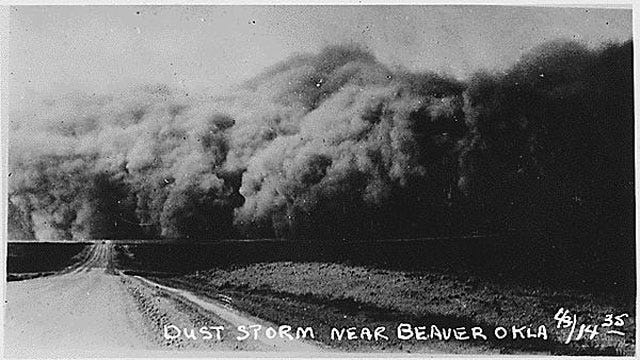
A cyclone destroys the new family home (would you let the Guthrie’s buy your lottery tickets?) and Nora seems to rejoice – indeed becomes happy. The convoluted tale of their living arrangements runs through the first part of the book and it almost feels that Guthrie’s mother blames successive houses for something unknown. She seems guilty about initially living in luxury as a result of Charley’s dubious dealing and fist fighting – a talent that Guthrie admires.
Chapter six ‘Boomchasers’ describes what happens to Okemah when oil is discovered – not for the best as it becomes a boomtown. Guthrie describes a very suspect election day, gang fights and general mayhem. Big Jim fights Little Jim and wins – Guthrie, known it seems as a local tough, fights Big Jim and wins and the adults watch on betting on the outcome. Finally, they all watch as neighbouring town Cromwell burns to the ground. None of it lasts and in time Okemah declines to be almost a ghost town.
Chapter seven describes the children’s gang fights; the tone then changes entirely as we witness Clara’s death – relayed with great pathos and extremely moving. Guthrie says little about the whys and wherefores whilst Klein is far more upfront about the circumstances. If you want to understand just how good a writer Guthrie can be then just read chapter 8. It seems Clara’s death stemmed from an argument with her mother about attending school (though we only learn that from Klein’s account). Guthrie recounts a death-bed scene wherein he is entreated not to cry and Clara’s teacher promises that Clara has indeed passed her test.
When considering Guthrie’s later selfish, erratic, strange, and intimidatingly sexualised behaviour, as revealed by Klein, some of the childhood experiences he suffered need to be examined. It was John Major who opined, ‘Society needs to condemn a little more and understand a little less’ – though I have always felt he meant something less negative than was apparent. However, what science rather than Tory common sense now tells us is that Adverse Childhood Experiences (ACEs) can be fundamentally formative. They,
‘Encompass various forms of physical and emotional abuse, neglect, and household dysfunction experienced in childhood. ACEs have been linked to premature death as well as to various health conditions, including those of mental disorders’.
Putting it bluntly Guthrie had a pretty shitty childhood which was compounded by the subsequent increasingly florid manifestation of an incurable, scarcely understood, genetic disorder that robbed him of a great deal of life. He was 55 when he died, and spent most of the last years (15 or so?) under medical care or hospitalised. At no time though does Guthrie bewail his upbringing.
The family moved to Oklahoma City and then back again to what seems little more than a hovel. Nora seems happy at first, Charley and son Roy get jobs, and then – the house burns down and Charley is quite seriously burnt. Nora, probably the instigator, is then permanently institutionalised. Briefly, an uncle offers the chance of work in a motorcycle franchise – but he is killed riding one. As the saying goes ‘One door closes and another one slams in your face’!
It is at this point that Guthrie feels that his father, ‘went down and stayed down’. He becomes the town’s scrap man before he succumbs to a fever and then joins his father in Pampas Texas, managing a residential block. Guthrie again demonstrates his writing skill as he sensitively describes how a fresh-faced country girl is seduced by the owner of the building. There is no salacious detail and there doesn’t need to be – there is a line drawing of a spidery consumptive older man hovering over his victim which says all. It’s during this time that Guthrie spends time in the local library, learns to play the guitar and to paint. He becomes a fortune-teller of sorts and briefly meets Heavy Chandler – an encounter that seems to stick with him. It’s also when his mother dies and Guthrie receives a letter with $1.50 in it – her legacy.

Guthrie – with ever itchy feet – moves to California. His paintbrushes are stolen by fellow travelers, he gets to understand why the church doesn’t deal in charity and that poor people are always more likely to help than the rich. There is a telling episode when he gets to the house of his rich relative in Sonora – and walks away thinking that it is grand, dead, and not for him. He visits a labour camp in Redding and treats us to another set-piece tour de force when he describes how two young girls can quieten the camp with their singing – including the drunks rampaging up from the local town. It’s at this point that it becomes apparent that perhaps his skill resides in short-story writing.
One of his less believable accounts is how he and others manage, post Pearl Harbour, to hold off a drunken mob intent on smashing up local Japanese businesses by singing, ‘We shall overcome’. It’s here that he meets the Cisco Kid (or Cisco Houston as we would know him?).
Our hero then falls in with a family group, apricot picking and stranded by a burst tyre. He learns about the iniquities of the truck payment system and how it could be exploited – and he makes his point without laying it on thick (it was eventually outlawed). Within this chapter is a touching love scene delicately rendered as no more than hand-holding and kissing. Best not to forget though that he was married at the time.
For the penultimate chapter, Guthrie is back in New York auditioning at the Rockefeller Centre (some kind of strange inverse symmetry there?) and soon realising that if selected he will be presented like some performing animal. Not surprisingly he flees and after a rather unconvincing Pied Piper routine through the streets of New York, spends the night carousing before we see him heading off into an unknown future on the back of a barge. The book closes with a reprise of the opening train journey wherein again the assorted travelers are treated reasonably by the local police. It closes with the far off promise of work and all singing,
This train don’t carry no smoker / Lyin’ tongues or two-bit jokers / This train is bound for glory / This Train!
Given its time and geographical setting, the book is notably short on references to black people. It is highly likely that Charley Guthrie was involved in a lynching in Okemah and was said to be a Klan member. It would in all likelihood be hard for his son not to have known something about it given that postcards of the gruesome scene were printed – as was apparently common. There is some mention of help afforded to Guthrie by black people as he travels – and he rides the cars with a black companion who he backs up when he is racially abused. The book though is relatively free of the casual racial assumptions that would have been common 80 years ago – even from those who considered themselves enlightened. We do know that Guthrie was a fairly close associate of Leadbelly and the burgeoning folk movement of the late ’50s seemed to be relatively open to other races.
A 2012 article from LA weekly paints a fairly unconvincing picture of Guthrie as a ‘big old racist’ – clearly written by someone who doesn’t have a lot of time for him. That said the supposed debunking of the ‘this machine kills fascists’ sticker just made me laugh.
‘His famous “This Machine Kills Fascists” slogan on his guitar? Turns out that was a morale-boosting WWII government slogan printed on stickers that were handed out to defense plant workers — capitalist propaganda if you will’.
It’s perhaps worth, in the name of balance, looking at some contrasting points of view, here and here
Guthrie meets meanness and spite and a wholesale lack of understanding but never the kind of brutality that is often seen as the hallmark – correctly or not – of his America. The Californian farmers wanted workers but didn’t welcome migrants, and thugs for hire and corrupt police did their bidding – often under the guise and possibly with the real reason, of wanting to move ‘agitators’ and ‘trouble makers’ on. Agitators who might object to the type of payment practices seen in the next to last chapter – the type of trouble makers who wanted a fairer share for all and for the country to be run for everyone and not for the few. Clearly, the times aren’t changing!
I am sure we are more fire conscious now but the conflagrations happen one after the other, houses, people and whole towns disappear in flames – and yet Guthrie sees no need to comment on a lamentable chain of events that would horrify the modern reader. Clara burns to death, Charley is badly injured, three houses burn down and the local town of Cromwell goes up in flames. Fire seems to be one of the dominant images of the book and of Guthrie’s life. Had he believed himself or his family to be cursed in some way then it would be understandable.
Guthrie reports some conversations in his early years in a way that is not believable – his word for word account of his rescue from a tree when he was aged 4 does not ring true – nor does the language which reveals a surprisingly comprehensive vocabulary – do we have his editor to thank for some of this? It’s a minor point but he does choose to record conversations as though they are literal. Some readers have commented on the structure of the book as it flits back and forth, others feel that it is often not easy to place his age as events unravel and, to a point, they are fair comments but not to the point of insurmountability.
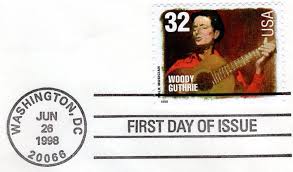
These are observations about an important and very readable classic that has passed into the folk mythology of America – mythologising, of course, being a potentially dangerous process. There is a comment in Klein’s book about Guthrie’s capacity for embroidering the facts in order to build a certain image. He is noted for his changing opinions and ideas (not a fault in my view – nothing is more stupid than sticking to something you know to be wrong). If he was fooled by Stalin he was only one of many.
I couldn’t find any version of Guthrie singing the traditional song, ‘This Train‘, which includes the phrase, ‘Bound for Glory’, but here is a pretty passable version by the man who, as much as anyone, carried the flame.


